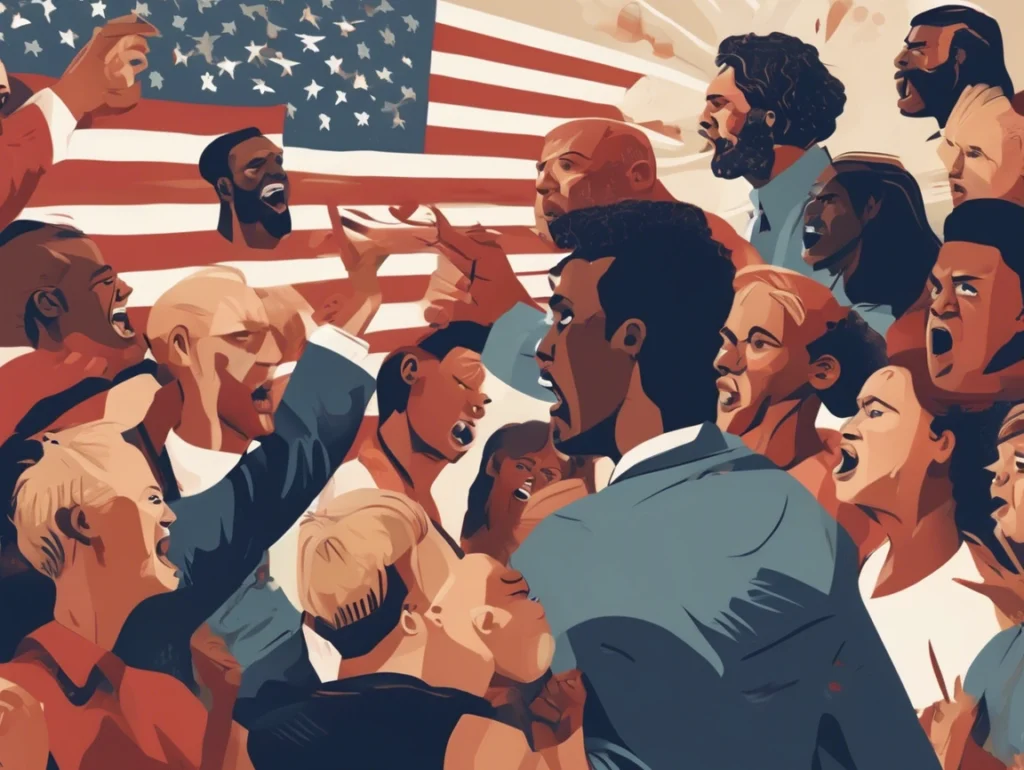They make you laugh. They support your dreams. They always split the last slice of pizza with you.
They also voted for them.
Welcome to modern love in a politically divided world.
In today’s climate, it feels like everything is politicized—pandemics, school policies, how we say “hello” at the grocery store. And for many couples, political differences are no longer background noise. They’re front and center in conversations, values, and even how we navigate the world.
So what happens when you love someone… but your worldviews are polar opposites?
Let’s talk about how to stay connected when your politics don’t align, why it doesn’t automatically mean doom, and how to move from frustration to understanding—even if you’ll never agree on a single ballot initiative.
Politics: The New Relationship Dealbreaker?
Once upon a time, you could say, “We just don’t talk about politics.” It was considered impolite dinner conversation, and many couples coexisted with different views without thinking much of it.
Today? Not so much.
Politics isn’t just about party affiliation anymore. It often signals your identity, your morals, and what kind of world you want to live in.
That’s why political clashes in relationships can feel so personal—even when they’re not intended to be. When someone you love supports something that feels harmful or backwards to you, it doesn’t just feel like disagreement. It can feel like betrayal.
And yet… love often defies logic.
So how do you hold space for love and connection when you see the world so differently?
Why Opposing Views Hurt More Now
Let’s break down why political differences are harder to navigate than ever:
1. Politics = Values
In today’s world, political issues are often moral ones. Healthcare, climate change, human rights, education—these aren’t abstract debates. They affect people’s lives. When you disagree with a partner, it can feel like they’re dismissing the values you hold dear.
2. We Live in Echo Chambers
Social media and algorithm-driven news feeds reinforce our beliefs and villainize “the other side.” So when someone we love doesn’t mirror our views, it can trigger cognitive dissonance—and fear. Are they wrong? Or are we?
3. Everything Feels More Urgent
From global pandemics to social justice movements to economic turmoil, everything feels higher-stakes. So political disagreements don’t just feel frustrating—they feel threatening.
“How Can I Love Someone Who Thinks That Way?”
It’s a fair question. And it’s one many people wrestle with in silence.
Loving someone doesn’t mean loving all their beliefs. But it does require curiosity, boundaries, and emotional maturity—especially when their beliefs challenge yours.
If you’re struggling with how to reconcile these differences, consider this:
- Can you separate the person from the policy?
- Are they willing to listen and grow, or are they rigid and demeaning?
- Do you feel safe, respected, and heard, even during disagreement?
- Is the tension about politics—or something deeper like control, fear, or past trauma?
Opposing political views don’t always mean the relationship is doomed. But they do mean that communication, empathy, and emotional safety are more important than ever.
Real Talk: When It Works (and When It Doesn’t)
Some couples with opposing political views thrive. They debate respectfully, challenge each other intellectually, and focus on shared values like family, kindness, or faith.
Others find the differences too emotionally charged to overlook. And that’s okay too.
It comes down to:
- How political your identity is
- How extreme the differences are
- How much mutual respect exists
- How each partner handles conflict
You don’t need to agree on every issue. But you do need to agree on how to disagree—without attacking, belittling, or shutting each other down.
Therapist’s Tips: Navigating Love with Political Differences
If you’re in love with someone who doesn’t vote or think like you, here are practical tips from relationship therapists to help you stay emotionally safe and connected:
💬 1. Agree on the Rules of Engagement
Tip: Set boundaries before political conversations start.
Therapists recommend couples create mutual guidelines for difficult discussions: no interrupting, no name-calling, and a safe word if it gets too heated. Boundaries don’t mean avoidance—they mean respect.
🧠 2. Seek to Understand, Not Convince
Tip: Ask open-ended questions like “What shaped that belief for you?”
Trying to “win” the argument almost always backfires. Instead, explore why they think what they think. Understanding doesn’t mean agreeing—but it does build empathy and reduce defensiveness.
⏸️ 3. Take Emotional Breaks
Tip: If it gets too charged, pause the conversation.
Licensed marriage therapists often teach couples how to recognize signs of emotional flooding—when you’re too upset to communicate productively. It’s okay to say, “I love you, but I need a minute.”
❤️ 4. Focus on Shared Values
Tip: Find the common ground beneath the disagreement.
Maybe you both care about safety, justice, opportunity, or family—you just see different paths to get there. Focusing on those shared core values can create bridges where walls once stood.
✋ 5. Know Your Limits
Tip: If your values feel constantly under attack, reevaluate.
Therapy isn’t about pretending differences don’t matter. If a partner’s views cause emotional harm, invalidate your identity, or create an unsafe dynamic, it’s okay to set firmer boundaries—or even walk away.
What to Say Instead of “How Could You Believe That?”
Navigating political differences requires compassion, not combat. Here are some alternative phrases to keep dialogue open:
| Instead of saying… | Try saying… |
|---|---|
| “How could you believe that?” | “Can you help me understand where that comes from?” |
| “You’re wrong.” | “That’s a different way of seeing it than I’m used to.” |
| “You’re being brainwashed.” | “Where do you usually get your news from?” |
| “I can’t talk to you about this.” | “This is hard for me to talk about, but I want to try.” |
| “This is ridiculous.” | “I’m struggling to see your side—can we slow it down?” |
Conflict Isn’t Always a Sign of Doom
Just like in other areas of love, conflict doesn’t mean collapse. It means you’re two individuals with different experiences trying to do life together. That’s not weakness. That’s brave.
Opposing political views don’t have to divide you—but only if both people are willing to listen, grow, and honor each other’s humanity.
If one person dominates, disrespects, or weaponizes their beliefs, the problem isn’t politics. It’s power.
Final Thoughts: Love in the Time of Polarization
It’s not easy to love across the aisle. It takes patience, emotional agility, and a willingness to sit with discomfort. But it’s also an opportunity—to build bridges, to practice empathy, and to prove that human connection can survive ideological storms.
In the end, relationships aren’t built on party platforms. They’re built on respect, shared laughter, late-night talks, and showing up—even when it’s hard.
So if you’re in love with someone whose ballot looks different than yours, take heart. You’re not alone. You’re not broken. And your relationship isn’t a political campaign—it’s a partnership.
One built not on agreement, but on understanding.

